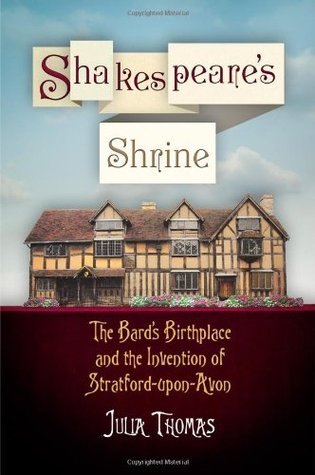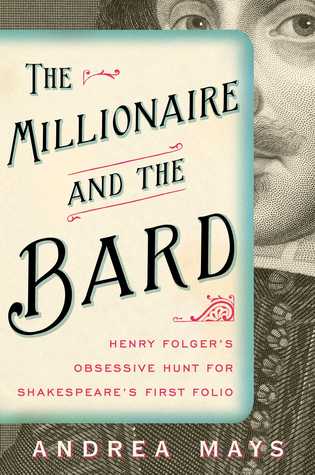
I truly do believe that. I don't think I will ever tire of reading about the greatest author of all time.
 Rating ⭐⭐⭐⭐⭐
Rating ⭐⭐⭐⭐⭐I stumbled upon this one recently and am so glad I did. The author masterfully fleshed out the Bard a bit more by recounting for readers the company he kept - from his time in Stratford-upon-Avon, to London, and back again.
This is aspect I had not really considered before - learning about Shakespeare through his friends. The debate will likely rage on forever whether or not Shakespeare really existed, or if it is simply a pseudonym for someone else. I firmly believe William Shakespeare was born in Stratford-upon-Avon, travelled to London after the birth of his children, became the greatest playwriter in history, then returned home upon retirement from theatre life.
Though this book does not purport to make a case for either side (though obviously sides with me given the content), it actually makes a fantastic case for Shakespeare being, well, Shakespeare. Through so much research, the author has found glimpses - MANY glimpses - of Shakespeare in the lives of those who knew him. Are we really to believe that those mentions in wills of deceased friends were placed there to through people off the track of the "real" genius behind the name? I hardly think so. Not only that, but Shakespeare is hardly the first writer to come from a bit humbler beginnings, and make it big in London. Why would it be possible for Ben Jonson to do this, but not William Shakespeare? Their educations would have been roughly the same, and both managed to write excellent characters in excellent plays that thrilled their audiences.
The author does a fantastic job showing who he was by showing us who he socialized with - either professionally, personally, or both. The book is divided into sections of those from his boyhood, to the fellow writers, actors, and so on who he worked with closely, or at arms-length.
Through the lives of his friends, Shakespeare is made just that much more whole to us, 400 years later. Though we will likely never know everything about him, this book certainly fills a gap.
Highly recommended.
Rating ⭐⭐⭐⭐⭐
I absolutely loved this one! Another accidental find, but a gem. Also, a chance to relive some of the best and worst scenes Shakespeare wrote.
The author also happens to be a chemist and in a very thorough and scientific way explored all the deliciously terrible ways the Bard killed off his characters.
It's pretty obvious that life in 16th/17th century London was hazardous. Plagues were always afoot, as were deaths by childbirth, public executions, and everyone's least fave: syphilis.
Death stalked many of his most famous characters and is a constant theme across many of his plays regardless of genre. In all, Shakespeare killed off a multitude of characters in a whopping 74 different ways. The author discusses each at length, analyzing how realistic his methods were. She looks at the science of the time and what Shakespeare's understanding of that might have been to determine the likelihood of these deaths actually occurring.
It's easy to see why death was such an easy thing for Shakespeare to write about - his livelihood depended on it. When bouts of plague came around, the theatres closed and no money could be made. So the troupe headed off to the countryside, and in those times Shakespeare wrote much of his poetry to support himself and his family. This cycle was repeated over and over. Death touched Shakespeare deeply personally as well, when his son Hamnet died at age eleven. Though Shakespeare would write comedies for a time after this, the tragedies were soon to come. And perhaps his greatest character ever, Hamlet, would soon grace the stage.
(Side note: When Shakespeare's First Folio was on tour a few years ago, it came to the Durham. The Folio was open to Hamlet's soliloquy and I am not even a little bit embarrassed to say I cried as I whisper-read it out loud. Volunteers asked if I was okay. I just nodded and kept reading/crying.)
The author discusses each type of death in its own chapter, including excerpts from the plays where said death occurred plus the larger context of what it meant to the plot as a whole. We see the whole gamut - poisoning (obviously), beheadings, suicide, war, and of course, bear attacks.
The author analyzes each of these and really gets into the yucky details at times. Yet, as it turns out, most of the time Shakespeare knew what he was talking about and the deaths were fairly realistic. I won't tell you which ones, that you will have to find out for yourself.
Highly recommended.
*************************************
(For those unfamiliar, this is a still from a show that airs on the History Channel called Pawn Stars. The show documents 'life' in a Las Vegas pawn shop run by Rick Harrison, the bald gentleman whose refrain is always, "The best I can do is..." when making an offer on an item.)














